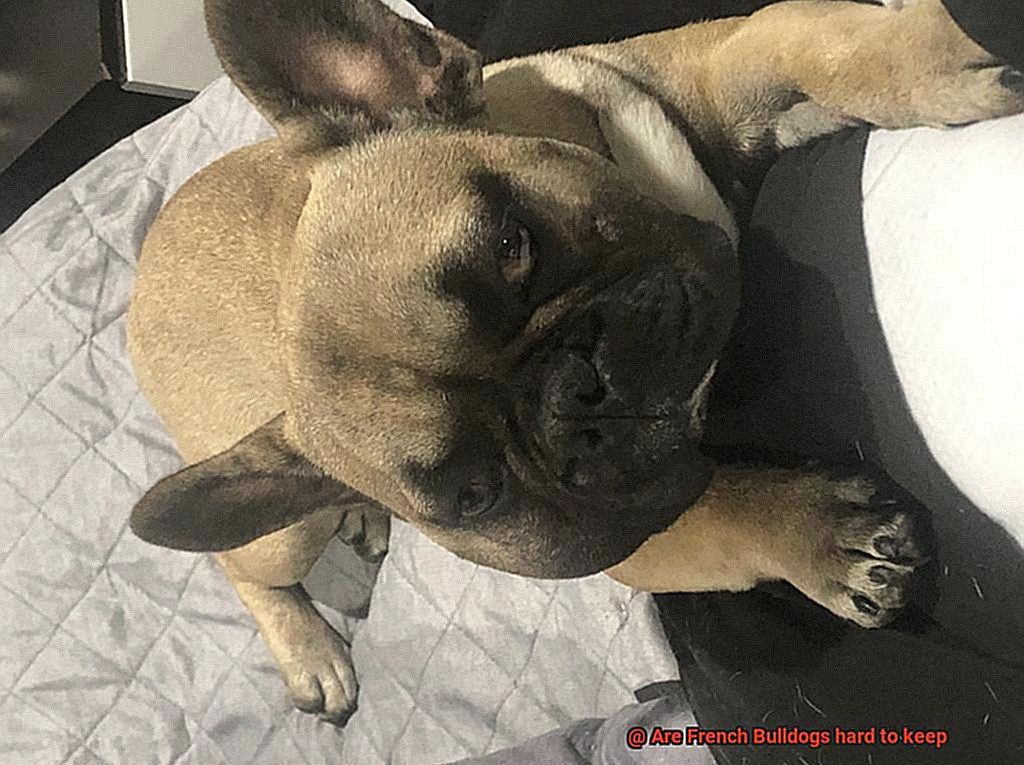Are French Bulldogs hard to keep?
Picture this: you’re strolling down the street when suddenly, you lock eyes with a French Bulldog. Those bat ears perk up, and their squishy face melts your heart in an instant. You can’t resist the temptation any longer – you’ve fallen head over paws for these adorable creatures. But before you dive into Frenchie ownership, let’s uncover the truth behind the hype.
Sure, French Bulldogs have skyrocketed in popularity lately. People rave about their affectionate nature and low exercise needs. But here’s the scoop: they aren’t exactly a walk in the park. Owning a French Bulldog requires dedication and responsibility. In this blog post, we’ll debunk the myth that they’re a breeze to care for and shed light on the challenges that come with these lovable little bulldogs.
Get ready for an adventure as we delve into the captivating world of French Bulldogs. We’ll explore their unique needs, quirky temperament, and what it truly takes to give them a life filled with happiness and fulfillment. So buckle up, fellow Frenchie fanatics. Together, we’ll unravel the mystery of whether French Bulldogs are as “hard to keep” as some claim. Spoiler alert: prepare to be surprised.
The Pros and Cons of Owning a French Bulldog
Contents
- 1 The Pros and Cons of Owning a French Bulldog
- 2 Physical Requirements for French Bulldogs
- 3 Common Health Issues in French Bulldogs
- 4 Mental Stimulation for French Bulldogs
- 5 Training a French Bulldog
- 5.1 Starting Early: Establishing Good Behavior and Obedience
- 5.2 Positive Reinforcement: Unlocking Their Potential
- 5.3 Consistency: The Key to Success
- 5.4 Gentle Approaches: Nurturing Confidence
- 5.5 Basic Obedience Training: Ensuring Safety and Good Behavior
- 5.6 Addressing Behavioral Issues: Seeking Professional Help
- 5.7 Mental Stimulation: Keeping Their Minds Sharp
- 6 Living Situation Needs for French Bulldogs
- 7 The Benefits of Owning a French Bulldog
- 8 How to Care for Your French Bulldog Properly
- 9 Conclusion
French Bulldogs, or “Frenchies,” are adorable and charismatic dogs that have gained popularity in recent years. However, like any other breed, they come with their own set of pros and cons. In this guide, we’ll delve into the advantages and disadvantages of owning a French Bulldog, providing you with valuable insights to help you make an informed decision.
Pros:
Affectionate and loyal companions:
French Bulldogs are renowned for their affectionate nature. They form strong bonds with their owners and are always ready to shower them with love and attention. Their loyalty knows no bounds, making them excellent family pets.
Low exercise needs:
If you lead a busy lifestyle or live in an apartment, you’ll be pleased to know that French Bulldogs have moderate exercise requirements. A short walk around the block or some playtime indoors is usually sufficient to keep them happy and healthy.

Excellent with children:
French Bulldogs have a gentle and patient demeanor, which makes them great companions for children. They are generally tolerant of their antics and enjoy being part of the family dynamic.
Low grooming needs:
With their short coats, French Bulldogs are relatively low-maintenance when it comes to grooming. Regular brushing to remove loose hair and occasional baths will keep them looking their best. However, it’s essential to clean their facial folds regularly to prevent infections.
Apartment-friendly:
French Bulldogs adapt well to apartment living due to their small size and minimal exercise requirements. They do not need a large yard to run around in, making them ideal for urban environments.
Cons:
Health issues:
One significant drawback of owning a French Bulldog is their susceptibility to certain health problems. Their brachycephalic (short-nosed) structure can lead to respiratory issues, making them prone to breathing difficulties. Additionally, they may also suffer from joint problems, allergies, and skin issues.
High maintenance breed:
Although French Bulldogs have low grooming needs, they require regular attention and care. Cleaning their facial folds, trimming their nails, and managing their drooling and snoring can be time-consuming tasks.
Expensive:
French Bulldogs can be quite expensive to purchase initially due to their high demand. Moreover, their potential health issues may require frequent vet visits and specialized care, adding to the overall expenses of owning one.
Prone to separation anxiety:
French Bulldogs are known for their strong attachment to their owners and can experience separation anxiety if left alone for extended periods. This can result in destructive behavior or excessive barking.
Stubbornness:
French Bulldogs have a stubborn streak, which can pose training challenges. Consistency, positive reinforcement, and patience are key when it comes to training these adorable yet independent dogs.
Physical Requirements for French Bulldogs
These adorable little pups have become increasingly popular in recent years, and it’s not hard to see why. With their cute smushy faces and charming personalities, Frenchies make wonderful companions. However, they do have some unique physical requirements that need to be taken into consideration to ensure they lead a healthy and happy lifestyle.
Exercise is important for all dogs, and French Bulldogs are no exception. However, their compact and muscular build can make certain activities more challenging for them. While they may not be the most athletic breed, they still require regular exercise to maintain a healthy weight and prevent obesity. Daily walks are a great way to keep them fit, but it’s important to choose the right time of day to avoid overheating. Early morning or late evening walks are ideal, especially during hot summer months.
French Bulldogs have short snouts and compromised respiratory systems, which can make them prone to overheating and breathing difficulties. It’s crucial to provide them with low-impact exercise that doesn’t put too much strain on their respiratory system. Avoid intense activities or prolonged play sessions that could exhaust them. Pay attention to their cues and provide regular breaks during physical activity.
Swimming can be an excellent form of exercise for French Bulldogs as it is low-impact and puts less strain on their joints. However, not all Frenchies are natural swimmers, so it’s important to introduce them to water slowly and ensure their safety at all times.
Due to their short snouts, French Bulldogs can have difficulty regulating their body temperature. They are sensitive to extreme temperatures, so it’s essential to provide them with a comfortable environment indoors and take precautions when venturing outside in hot or cold weather. Avoid exposing them to excessive heat or cold temperatures for extended periods.

Grooming is another aspect of French Bulldog care that shouldn’t be overlooked. Their short coat requires regular brushing to minimize shedding and keep their skin healthy. Additionally, their facial wrinkles should be cleaned regularly to prevent infections.
Common Health Issues in French Bulldogs
It’s crucial to be aware of the common health issues that can affect these adorable pooches. In this blog post, we will delve into some of the most prevalent health concerns faced by French Bulldogs and provide practical tips to help you keep your furry friend in tip-top shape.
Respiratory Problems:
Due to their short snouts, French Bulldogs are prone to respiratory issues. Keep an eye out for signs such as snoring, wheezing, and difficulty breathing. Ensure they have access to a well-ventilated environment and avoid exposing them to extreme temperatures. In hot weather, provide plenty of fresh water and limit exercise during peak heat hours.
Allergies:
Just like humans, French Bulldogs can develop allergies too. Common allergens include certain foods, pollen, dust mites, and even fleas. Keep an eye out for symptoms like itching, excessive scratching, redness, and ear infections. Consult your vet to identify the triggers and explore appropriate treatment options such as dietary changes or allergy medications.
Eye Issues:
With their adorable bulging eyes, French Bulldogs are more susceptible to eye injuries and infections. Regularly clean their eyes with a vet-approved solution and look out for signs of irritation, discharge, or cloudiness. Conditions like cherry eye (a protrusion of the third eyelid gland) and dry eye (insufficient tear production) require immediate veterinary attention.
Skin Sensitivities:
French Bulldogs are prone to various skin conditions such as dermatitis and bacterial infections. Regular grooming is key to maintaining healthy skin – bathe them regularly with a gentle shampoo, brush their coat to remove dead hair, and pay special attention to those adorable skin folds. A balanced diet rich in essential fatty acids can also contribute to healthy skin.
Genetic Disorders:
Unfortunately, French Bulldogs are predisposed to certain genetic conditions. Hip dysplasia, luxating patella, congenital deafness, and heart diseases are among the most common. When choosing a French Bulldog puppy, ensure you work with a reputable breeder who conducts health screenings on their breeding dogs. Regular veterinary check-ups are vital for early detection and management of these conditions.
Mental Stimulation for French Bulldogs
Interactive Toys and Puzzles: Entertain and Educate
- Treat-dispensing toys keep your Frenchie on their paws as they figure out how to access those tasty treats.
- Puzzle toys challenge their problem-solving skills and keep them mentally engaged for longer periods.
Training Exercises: Smart Dogs, Smart Tricks

- French Bulldogs are highly intelligent and eager to please, making them a breeze to train.
- Regular training sessions not only teach them new commands and tricks but also provide mental challenges that keep their minds sharp.
Scent Games: Follow That Nose.
- Tap into your Frenchie’s excellent sense of smell by hiding treats around the house or yard.
- Encourage them to use their nose to sniff out the hidden goodies, keeping their minds active and their tails wagging.
Socialization: Expand Their World
- Expose your Frenchie to different people, animals, and environments from a young age.
- Take them on walks in new locations, visit dog parks, or arrange playdates with other friendly dogs.
- These experiences provide social interaction and mental stimulation, keeping your Frenchie’s mind engaged.
Routine Changes and Environmental Enrichment: Shake Things Up.
- Introduce new toys to keep things fresh and exciting.
- Rotate their play areas or rearrange furniture to provide novelty and prevent monotony.
- Expose them to different sounds, sights, and textures to keep their minds active and prevent boredom.

Training a French Bulldog
French Bulldogs are known for their charming personalities and unique appearance. However, they can also be stubborn and independent, which can make training them a bit challenging. In this comprehensive guide, we will explore the importance of consistency, positive reinforcement, and mental stimulation when training a French Bulldog.
Starting Early: Establishing Good Behavior and Obedience
Training your French Bulldog should ideally start from a young age. This is the time when their minds are most receptive to learning and they are eager to please. Early socialization is also crucial to prevent any behavioral issues later on. Expose them to different people, animals, and environments to ensure they grow up to be well-rounded individuals.
Positive Reinforcement: Unlocking Their Potential
French Bulldogs respond best to positive reinforcement methods. They thrive on rewards-based training, so be sure to have plenty of treats, praise, and playtime at hand. Whenever they exhibit good behavior or successfully follow a command, reward them immediately. This will create a positive association in their minds and motivate them to continue behaving well.
Consistency: The Key to Success
Consistency is absolutely vital when training a French Bulldog. Set clear rules and boundaries from the beginning and stick to them consistently. This helps them understand what is expected of them and reduces confusion. For example, if you don’t want your Frenchie on the furniture, never allow them on it – even if they give you those irresistible puppy dog eyes.
Gentle Approaches: Nurturing Confidence
French Bulldogs can be sensitive to harsh training methods or punishment. It’s important to use gentle and patient approaches during their training sessions. Avoid any tactics that may cause fear or anxiety in them. Instead, focus on building their confidence through positive reinforcement and encouragement.
Basic Obedience Training: Ensuring Safety and Good Behavior
Teaching basic obedience commands such as sit, stay, come, and heel should be a priority when training your French Bulldog. These commands not only ensure their safety but also make them well-behaved companions. Remember to keep training sessions short and engaging, as French Bulldogs have a stubborn streak. Incorporate fun activities and games to keep them interested and motivated.
Addressing Behavioral Issues: Seeking Professional Help
If your French Bulldog displays specific behavioral issues like excessive barking or separation anxiety, it’s important to address them promptly. Seek professional help if needed, as trainers experienced with French Bulldogs can provide valuable guidance and support.
Mental Stimulation: Keeping Their Minds Sharp
In addition to obedience training, providing mental stimulation is crucial for French Bulldogs. They are intelligent dogs and need mental challenges to prevent boredom and destructive behavior. Interactive toys, puzzle games, and regular exercise are great ways to keep their minds engaged and active. Think of it as unlocking their treasure chest of intelligence.
Living Situation Needs for French Bulldogs
French Bulldogs, known for their adorable wrinkled faces and playful personalities, have specific living situation needs that owners should be aware of to ensure their well-being. From temperature regulation to socialization, here are some key factors to consider when providing a living environment for your French Bulldog:
- Temperature Control: French Bulldogs are brachycephalic (short-nosed) dogs, which makes them more prone to heat exhaustion and respiratory issues. To keep them comfortable, ensure that their living space is well-ventilated and not excessively hot. Consider using air conditioning or fans to regulate the temperature and prevent overheating.
- Cold Weather Precautions: Due to their short coat, French Bulldogs are not well-suited for extreme cold weather. Provide them with appropriate shelter and protection during colder months, such as a warm dog bed or clothing. Avoid leaving them outside for extended periods in freezing temperatures.
- Indoor Living: French Bulldogs are indoor dogs and do not tolerate extreme temperatures well. They are sensitive to heat and can easily overheat, so it is important to keep them indoors during hot weather or provide them with access to shaded areas if they are outside.
- Exercise Space: While French Bulldogs are generally low-energy dogs, they still require daily exercise to maintain a healthy weight and mental stimulation. A small backyard or regular walks around the neighborhood can be sufficient for their exercise needs.
- Separation Anxiety: French Bulldogs can be prone to separation anxiety, so they may not do well in homes where they are left alone for long periods of time. They thrive on human companionship and may become anxious or develop destructive behaviors if left alone for too long. Consider hiring a dog walker or providing them with interactive toys to keep them mentally stimulated while you’re away.
- Socialization: French Bulldogs are generally good with children and other pets, but proper socialization is key. Supervise their interactions, especially with younger children who may unintentionally harm them due to their small size. Start socializing them from a young age to ensure they are comfortable around other animals and people.
The Benefits of Owning a French Bulldog
If you’re considering adding a furry friend to your family, look no further than the lovable French Bulldog. Known for their affectionate nature and friendly personalities, French Bulldogs make excellent companions for individuals and families alike. As an experienced owner of this delightful breed, I can attest to the many advantages of owning a French Bulldog. Let’s dive into the benefits that come with having one of these adorable pups by your side.
- Adaptability: One of the greatest benefits of owning a French Bulldog is their adaptability to various living situations. Whether you live in a cozy apartment or a smaller home, these dogs can thrive in any environment. Unlike some other breeds, French Bulldogs do not require large amounts of exercise, making them ideal companions for individuals who may not have the time or energy for long walks or intense play sessions.
- Low Maintenance Grooming: Another advantage of owning a French Bulldog is their low maintenance grooming needs. Their short coats require minimal brushing, and they do not shed excessively. This makes them a great choice for individuals with allergies or those who prefer a cleaner living environment.
- Well-Behaved and Easy to Train: French Bulldogs are generally well-behaved and easy to train. With their intelligence and eagerness to please, they respond well to positive reinforcement methods. Through consistent training and socialization, these dogs can become well-rounded and obedient pets.
- Protective Nature: Despite their small size, French Bulldogs have a protective nature. They are loyal and will alert their owners if they sense any potential danger or strangers approaching. This makes them excellent watchdogs and provides peace of mind for their owners.
- Great with Children: French Bulldogs are known for their compatibility with children and can be quite tolerant of their antics. However, it’s important to supervise interactions between young children and dogs to ensure safety for both parties.
- Comical Personalities: French Bulldogs are full of personality and have a playful and mischievous side. Their comical antics and quirky behaviors can bring joy and entertainment to your life. From their goofy expressions to their silly antics, they will keep you laughing for hours.
- Emotional Support and Companionship: Lastly, owning a French Bulldog can provide emotional support and companionship. These dogs are known to be great emotional support animals due to their affectionate nature and ability to provide comfort during difficult times. Whether you’re feeling down or just need a cuddle buddy, a French Bulldog will always be there for you.
How to Care for Your French Bulldog Properly
French Bulldogs are adorable and affectionate companions that bring joy to many households. However, they have specific care needs that must be met to keep them healthy and happy. In this comprehensive guide, we will explore the essential steps to caring for your French Bulldog properly, covering topics such as diet, exercise, grooming, health care, and providing a loving environment.
Nourishing their bodies with a balanced diet:
French Bulldogs have sensitive stomachs, so it’s important to provide them with a nutritious and well-balanced diet. Feed them high-quality dog food that is appropriate for their age, size, and activity level. Avoid foods that can be harmful to them, such as chocolate, grapes, and onions. Monitoring their calorie intake is crucial as they can be prone to weight gain.
Keeping them active and fit:
While French Bulldogs may not require as much exercise as some other breeds, they still need daily walks and playtime to keep them physically and mentally stimulated. Take them on short walks or engage in interactive play sessions. Be mindful of their limitations due to their brachycephalic structure and avoid overexertion or exercising in extreme temperatures.
Maintaining their hygiene with regular grooming:
French Bulldogs have short coats that shed moderately. Brushing their coat weekly helps keep it healthy and reduces shedding. Don’t forget to clean their adorable facial wrinkles with a damp cloth to prevent infections. Trim their nails regularly and clean their ears to prevent any issues.
Protecting their respiratory health:
Due to their short snouts, French Bulldogs can be prone to respiratory issues. Avoid excessive exercise in hot weather or environments with poor air quality. Provide them with a cool and well-ventilated living environment, especially during the summer months.
Prioritizing regular veterinary care:
Regular check-ups with a veterinarian are crucial for monitoring your French Bulldog’s overall health. They are prone to certain health issues, so it’s important to stay up-to-date with vaccinations, parasite prevention, and dental examinations. Early detection of any potential problems can lead to better outcomes.
Providing love, attention, and mental stimulation:
French Bulldogs thrive on human companionship and can develop separation anxiety if left alone for long periods. Spend quality time with them, provide them with toys and puzzles for mental stimulation, and engage in positive reinforcement training sessions to ensure they become well-behaved and obedient dogs.
Em5WE9QFfa0″ >
Conclusion
In conclusion, owning a French Bulldog requires dedication and effort.
While they may not be the easiest breed to keep, their unique personality and charm make it all worthwhile. From regular exercise to proper grooming and training, there are certain responsibilities that come with being a French Bulldog owner.
But don’t let that discourage you. With their adorable smooshed faces and affectionate nature, these little pups will quickly become your best friend.
Get ready for endless cuddles, playful antics, and unconditional love.




